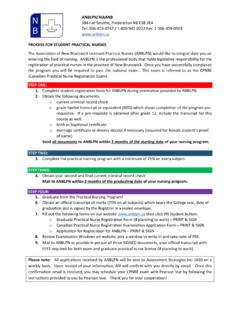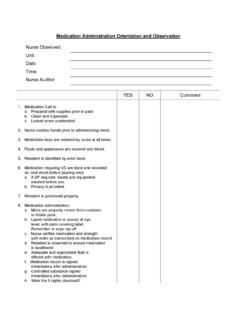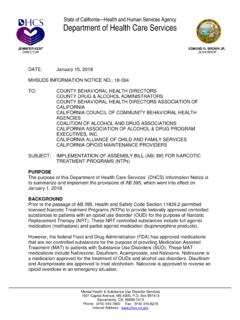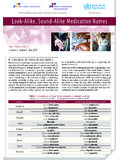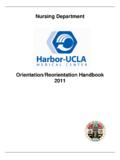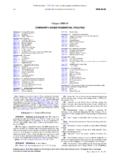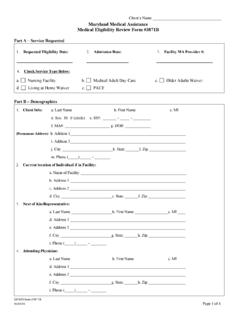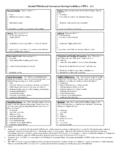Transcription of Medication Administration Guidelines Licensed …
1 Medication Administration Guidelines Licensed practical nurse Association of New Brunswick Licensed practical Nurses 2014 2 Acknowledgements ANBLPN would like to acknowledge the Registered Nurses and Licensed practical Nurses who participated on the Guideline Development Committee and provided their expertise to the development of these Guidelines . This document represents the content of the Medication Administration Guidelines for the LPN in the Adult Acute Care Setting as well as Medication Administration for the Licensed practical nurse in the Nursing Home Setting . ANBLPN would like to thank the College of Nurses of Ontario and the College of Licensed practical Nurses of British Columbia, for giving permission to adapt certain sections of their documents.
2 Approved by: the Board of Directors of The Association of New Brunswick Licensed practical Nurses October 2007/Revised July 2014 3 Development Committee Members Medication Administration Guidelines for the LPN in the Adult Acute Care Setting Medication Administration for the LPN in the Nursing Home Setting Kira Cathline, LPN, Residential Region 2 Luc Drisdelle RN, MN Clinical nurse Region 1SE Mariette Duke RN, , , Project Region 1B Bruno Ferron RN, , Project Dept of Health Cindy Goggan RN, BN, Nursing Resource Region 2 JoAnne Graham, LPN, Practice ANBLPN Katherine Hennessy RN, MN, Clinical nurse Region 7 Nicole D. Labrie RN, Director of Region 4 Raelyn Lagac RN, BN, nurse Region 5 Susan LeBlanc RN, BN, nurse Region 6 Geralyn Levandier, LPN, Emergency Region 3 Alice Th riault BN, , Chief Nursing Dept of Health Doug Wheeler, RN, BN, MEd, Director of Practice and Jodi Hall, Education Practice Cindy Willett, Joyce Gray, Noreen Richard, Director of Professional Practice & Health Barbara Cook, Director of Kim Brown, RN.
3 Edna Lanteigne-Cormier, JoAnne Graham, Revised & Reviewed 2014: Christie Ruff, LPN Practice Joanne Graham, LPN Executive NANB ANBLPN Campbellton NH Mt St Joseph NH NANB Spencer NH St John/St Stephen Villa Beausejour Grand Falls Manor ANBLPN ANBLPN 4 Table of Contents Development Committee Guideline Introduction .. Purpose and Application of the Expectations: Of Of p. 8 p. 8 Standards of Medication p. 9 Guidelines for LPN Medication Administration Guideline # 1 Complexity and Predictability of the Client Guideline # 2 Routes of Medication Guideline # 3 Range Dose Medication Guideline # 4 PRN Medication Guideline # 5 Stat Medication Guideline # 6 Controlled Guideline #7- p.
4 17 Guideline # 8 Acceptance and Transcription of Medication Guideline #9 Standing Orders for Guideline #10 Medication 5 Guideline Summary 1. The LPN administers Medication according to his/her scope of practice and when appropriate for the client complexity and predictability. 2. The LPN administers medications via routes as per individual LPN competence. 3. The LPN administers medications prescribed with a range dose in consultation with the RN. 4. The LPN administers PRN medications based on the client s care needs. 5. The LPN administers stat Medication as directed by, and under the supervision of, the RN, NP or physician. 6. The LPN administers narcotics and other controlled substances in accordance with Medication Administration standards, agency policy and national legislation.
5 7. The LPN may administer immunizations in practice settings with the appropriate practice supports. 8. The LPN may accept and transcribe facsimile, verbal and telephone Medication orders. 9. The LPN administers standing order medications in consultation with the RN. 10. The LPN supports client safety by reporting Medication errors as per agency policy and takes appropriate action to prevent Medication errors. 6 Introduction The Licensed practical nurse (LPN) began administering Medication in the New Brunswick long-term care setting in 1993 as the result of a pilot project, which turned into a government sponsored program for New Brunswick nursing homes in 1996. Medication Administration continued to be taught to LPNs through post basic education until 2000, when Medication Administration became a basic competency in practical nurse education.
6 Medication Administration is now a mandated competency for all LPN s practicing in the province of New Brunswick and members may not hold a license without this education. Since this time, the role of the LPN in regards to Medication Administration has evolved. Traditionally, LPN practice of Medication Administration has been limited by location, specifically nursing homes. However, clinical decision making regarding when and where it is appropriate for the LPN to practice the competency of Medication Administration in acute care settings should not be determined by location, but be based on the following factors (1-references): Care requirements of the client including complexity and care needs, the predictability of outcomes and the risks of negative outcomes; Competencies, and care provider characteristics including education, experience, and expertise to meet cognitive and technical skill requirements.
7 And Practice setting characteristics including care delivery model and available supports such as availability and access to resources, support for new personnel, policies, procedures, decision-making guides. Additionally, workload and environmental stability must be considered. The Guidelines in this document reflect these factors, and were created as a result of the provincial committee s work, feedback from various stakeholders and the Association of New Brunswick Licensed practical nurse s (ANBLPN) understanding of Medication Administration issues as they affect and apply to LPNs and the rest of the nursing care team. 7 Purpose The purpose of this document is to provide provincial Guidelines regarding Medication Administration by LPN s: These Guidelines will: Identify related competencies with respect to Medication Administration .
8 Clarify what are reasonable expectations of the LPN role regarding Medication Administration . Provide useful information to the nursing care team to support LPN Medication Administration . Create a collaborative working relationship between members of the nursing care team through the implementation of these Guidelines . Ensure safe quality client care by providing directions pertaining to the LPN work assignment. Application of the Guidelines The Guidelines in this document are to be applied in consideration of the following (1): The RN is responsible for the overall direction of nursing care identified in the nursing care plan, but is not responsible for the nursing care delivered by the LPN.
9 As members of a self-regulated profession, the LPN is accountable for decisions, actions and own level of competency, including Medication Administration . The Registered nurse (RN), although responsible for the overall direction of nursing care, is not necessarily directly responsible for managing the performance of the LPN. All nursing care providers as employees report directly to their first line manager. The working relationship between the RN and LPN is one of colleagues who collaborate and communicate to determine the care needs of their clients. The working relationship between the RN and LPN must be built on trust and mutual respect. The Association of New Brunswick Licensed practical Nurses is responsible to set standards for member practice as identified in the LPN Act (2014) 8 Expectations Of LPNs: To administer Medication , the LPN is required by ANBLPN to: Successfully complete an approved Medication Administration education program consisting of theoretical, laboratory and clinical components.
10 Maintain competence through sufficient clinical practice and participation in on-going continuing education and/or in-service education regarding pharmaceuticals and Medication Administration techniques. LPNs have a professional responsibility to identify their own competence maintenance needs and then determine how those needs could be met. This may take the form of seeking assistance from an employer, or seeking educational materials outside of their employer, such as on the internet, drug manufacturer educational materials or the education department of the ANBLPN. Adhere to facility policy and procedure where employed. Of Employers: Employers are partners with the nursing care team in the delivery of client care.



